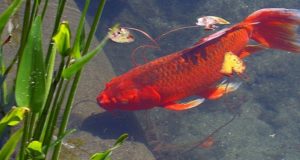Hello everyone! Craig here again. Within the hobby there are certain niches that develop for fish keeping. You have your African Cichlid aficionados like Jose, reef geeks like Cory, the discus fanatics, and many others. Then you have those hobbyists that are into livebearers. When I say livebearers, I am not just talking about Mickey Mouse Platies or Twinbar Swordtails, but also odd and wonderful livebearers known as Goodeids.
We recently hosted our local aquarium club (Aquarium Club of Lancaster County) for their monthly meeting here at TFP. Their guest speaker was Rit Forcier, who has long been associated with rare livebearers and their conservation. He spoke about a trip to Mexico in which he spent much of his time collecting and studying wild Goodeids. He was even kind enough to bring some of his personal stock.
An Interesting Family
So, what is a Goodeid anyway? The Goodeids are a family of livebearers that occur naturally in the shallow waters of Mexico. Livebearers (from genera including Ameca, Xenotaca, Skiffia, Ilyodon and others) are viviparous, which means that the fish embryo develops inside the mother in the same way that it does for mammals. Pretty amazing from an evolutionary standpoint! Many of these fish, due to habitat destruction and pollution, are nearly extinct in the wild. Through captive breeding, several species that are now extinct in the wild, such as the
Butterfly Splitfin, Ameca splendens, have been saved from complete eradication.
Goodeids are well known for being relatively sturdy in captivity and, given the proper conditions, will reproduce in the home aquarium. They do quite well in hard, alkaline water, and appreciate some plants and wood for cover. If there is one downside to these fish, it is that they can be a bit pushy, especially when a male wants to court a female. Apart from that, fish make interesting and colorful aquarium inhabitants. If you want to try something a little different, Goodeids are a wonderful choice.
A Word on Aquarium Clubs
If you have a local aquarium club chapter, you too can have an actual positive impact on the conservation and preservation of some pretty amazing fish. Helping to establish captive breeding populations may be the only hope for some of these fish, and dedicated hobbyists and conservationists are leading the way! Check for local clubs in your area, they’re fun, informative and a great way to share information on your favorite past time.
More Info
If you’re local, check out the ACLC website here.
You can also find a list of clubs by state here .
And for all things Goodeid, take a look at this site
For more on all livebearers, see here
Thanks,
Until next time,
Craig
 That Fish Blog – Aquarium Advice and Information
That Fish Blog – Aquarium Advice and Information

